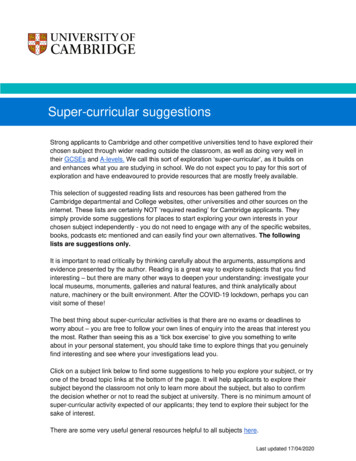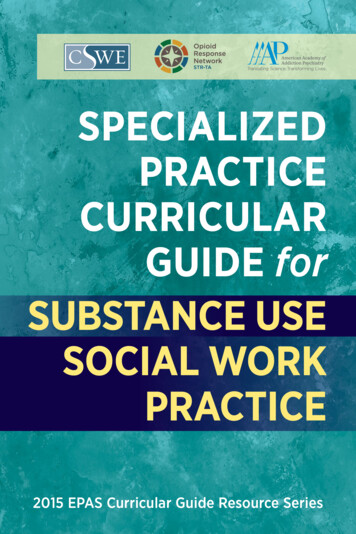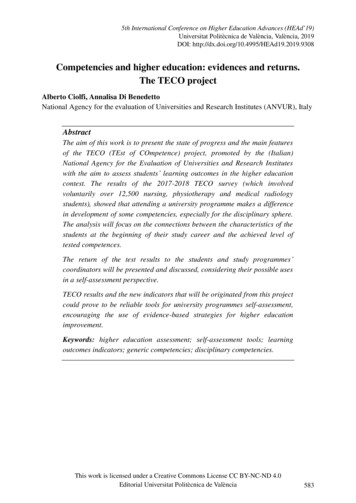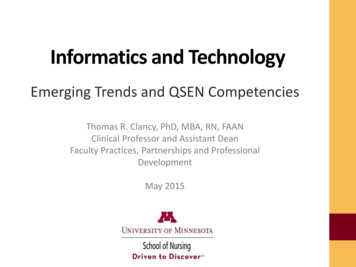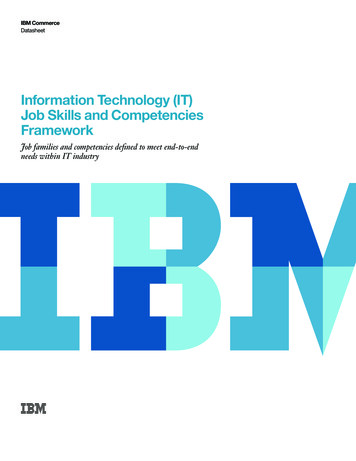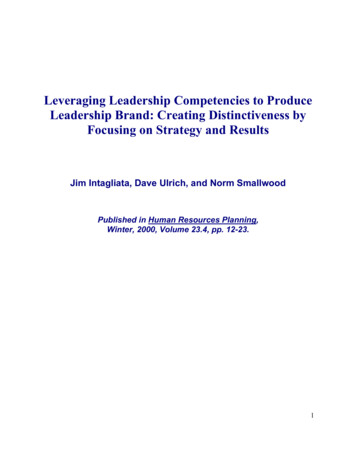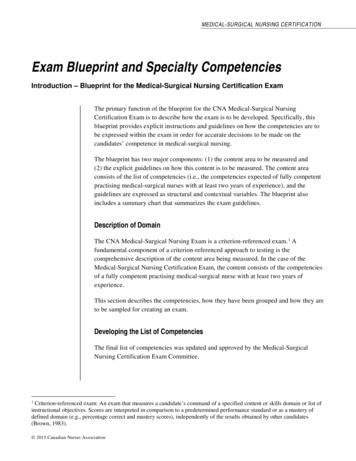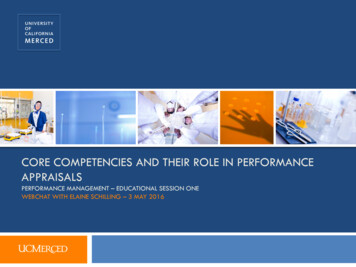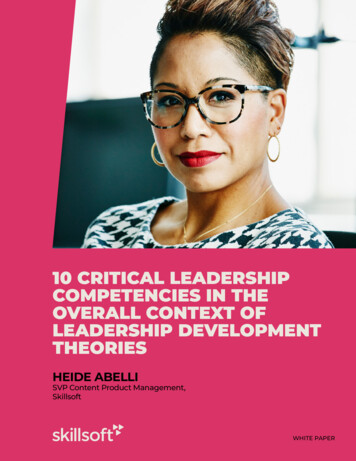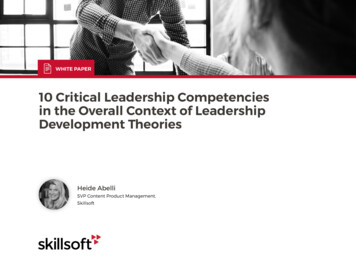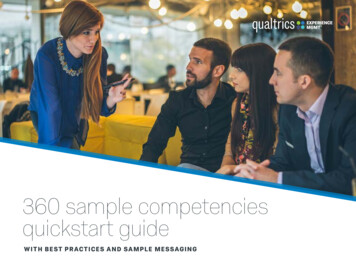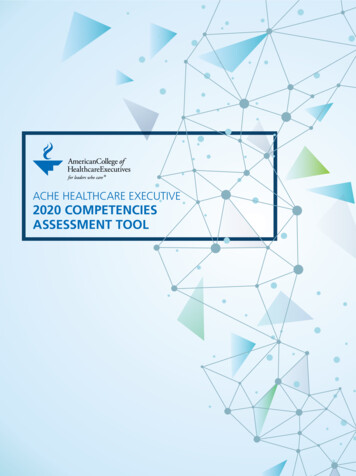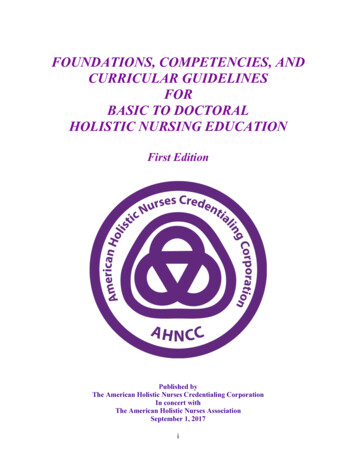
Transcription
FOUNDATIONS, COMPETENCIES, ANDCURRICULAR GUIDELINESFORBASIC TO DOCTORALHOLISTIC NURSING EDUCATIONFirst EditionPublished byThe American Holistic Nurses Credentialing CorporationIn concert withThe American Holistic Nurses AssociationSeptember 1, 2017i
Foundations, Competencies, and Curricular Guidelines for Basic toDoctoral Holistic Nursing Education, Edition 1 is available for digitaldownload without charge from October 15, 2017 to September 30, 2018. Several toolkits, designed to facilitate faculty in the design, development, and implementation willbe released January 1, 2018-September 30, 2018. Links for the available downloads willbe announced at http://ahncc.org/curricular-guidelines.Copyright 2017 American Holistic Nurses Credentialing Corporation. All rightsreserved. Reproduction or transmission in any form is not permitted without writtenpermission of the American Holistic Nurses Credentialing Corporation (AHNCC). Thispublication may not be translated without written permission of AHNCC. For inquiries,or to report unauthorized use, email ahncc@flash.net.ii
AUTHORSHelen L. Erickson, PhD, RN, AHN-BC, FAAN is Professor Emeritus, The University of Texas atAustin. Helen has held faculty and administrative positions at The University of Michigan at AnnArbor, University of South Carolina, and The University of Texas at Austin (UTA). She has alsomaintained a private practice; served as an international clinical and educational consultant; authored,co-authored books, chapters, and articles on theoretical Holistic Nursing; and developed and tested theholistic theory, Modeling and Role-modeling. She has received numerous awards, including AHNANurse of the Year and Life Time Achievement, and is recipient of the University of Texas, Helen LErickson Endowed Lectureship on Holistic Healing. helenerickson@att.netMargaret E. Erickson, PhD, RN, APHN-BC, APRN, CNS is Chief Executive Officer, TheAmerican Holistic Nurses Credentialing Corporation. Margaret has taught baccalaureate and graduatedidactic and clinical nursing courses at The University of Texas at Austin and Tennessee StateUniversity where her focus was to facilitate students in learning and implementing holistic theorybased practice. She has extensive clinical experience with practice extending across populations andsettings; developed and tested a model for assessing bonding and attachment between mother andinfant; and authored and coauthored chapters and article that describe relations among attachment,need satisfaction, human development processes, and self-care resources. ahncc@flash.netMary Enzman Hines, APRN, PhD, CNS, CPNP, APHN-BC is Professor Emeritus, University ofColorado, Colorado Springs, Co-Owner of Integrative Pediatric Health Care, LLC. Mary is the pastpresident of AHNA, a certified Pediatric Nurse Practitioner (CPNP-PC), certified Advanced PracticeHolistic Nurse (APHN-BC), and a recognized researcher, educator, and consultant in Holistic Nursingand integrative healthcare. She has authored several chapters and articles on developing andimplementing holistic graduate curriculum and education, advanced practice Holistic Nursing; herresearch focused on caring/healing in Holistic Nursing practice and advanced practice. Mary developedthe first fully online holistic DNP program, funded by HRSA at the University of Colorado. ColoradoSprings, and guided many graduate students to embrace and actualize a unitary, holistic clinicalpractice. She opened the first co-owned and operated integrative pediatric nurse practitioner practice inColorado serving children and families seeking a holistic health experience. She has been recognizedwith several awards for her work in holism including the Holistic Nurse of the Year by AHNA.maryenzmanhines@aol.comM. Kay Sandor, PhD, RN, LPC, AHN-BC is a retired Professor of Nursing, The University of TexasMedical Branch, Galveston TX. Kay is a board certified Advanced Holistic Nurse (AHN-BC ) and alicensed professional counselor (LPC) and psychotherapist. Her specialty as a nurse psychotherapist isgrief and loss and working with the actively dying. She is also a Benedictine Oblate with ties to the St.Scholastica Monastery in Boerne, Texas and Emmaus House in Charley Creek, Montana. She is also aVeriditas labyrinth facilitator.www.thespiritspace.com kay.sandor@gmail.comDeborah Shields, PhD, RN, AHN-BC, QTTT, CCRN, Professor, Capital University, Columbus,Ohio. Deborah Shields is a board certified Advanced Holistic Nurse and a qualified Therapeutic Touchpractitioner and teacher. She has mentored baccalaureate and graduate student interested in the holisticparadigm and practice skills throughout her teaching career. She was Co-Editor and contributingauthor to the Seventh Edition Holistic Nursing: A Handbook for Practice. Deborah serves on served oniii
the Board of Directors of the American Holistic Nurses Association (AHNA) and as the AHNA NursePeer Review Leader. Deborah is also a staff nurse, caring for people experiencing peri-operativeprocedures. Her current practice and scholarship includes developing Holistic Nursing educationcurricula, integrating aesthetics into practice, and theory development. debshields@aol.comMary Elaine Southard, DNP, RN, CNS, APHN-BC, HWNC-BC is Associate Professor, GraduateNursing, College of New Rochelle. Mary Elaine has been a national/international leader, educator,author, and clinician in Integrative Health and Nurse Coaching with diverse experience, includingpopulation health management, insurance, information technology, oncology, primary care, and aprivate Integrative Consulting and Coaching practice in Scranton, Pennsylvania. She is Board Certifiedas an Advanced Practice Holistic Nurse and Nurse Coach and past Board Member of AHNCC. Herresearch focuses on using the Omaha System in Nurse Coaching as a key to practice, documentation,and information management. mescoach@aol.com.CONSULTANTTerri Roberts, J.D. RN is the Executive Director of the American Holistic Nurses Association, aposition she has held since 2012. AHNA is the specialty nursing association for Holistic Nurses with amembership of 4500 with its headquarters in Topeka, Kansas. Prior to that, for 23 years she served asthe Executive Director of the Kansas State Nurses Association (KSNA), the professional organizationfor registered nurses. Terri is a 1978 graduate of Washburn University School of Nursing and a 1982graduate of Washburn University School of Law. She is a Past-President of the Kansas Society ofAssociation Executives (2004-2005).iv
OVERVIEWThe increasing globalization of healthcare, changing demographics and expanding diversity ofpopulations, and rapid technological changes mandate that nurses possess diverse skills andcompetencies to provide holistic, culturally sensitive healthcare (Institute of Medicine, 2001; 2003a,2003b; 2010a, 2010b, 2010c). The Essentials of Baccalaureate Education (AACN, 2008), Essentials ofGraduate Education (AACN, 2011), and Graduate-level QSEN Competencies: Knowledge, skills, andattitudes (AACN, 2012) delineate academic criteria required to prepare baccalaureate and graduatenurses, respectively. Concurrently, the Standards of Practice (ANA, 2015; AHNA/ANA, 2018) providedirection for state and national legislation of nursing practice. The recent shift in focus on personcentered care, health, and wellness indicates a need to compliment the Essentials to includeknowledge, skills, and attitudes based in the foundations of holistic philosophy, theories, and healthsciences that emphasize the inter-personal relations between nurse and consumers, dynamic relationsamong mind-body-spirit, the individual’s perspectives as primary information, and factors that affectthe individual’s wellness and wellbeing.Holistic Nursing, an integration of science and art, is based in the belief that humans areunitary, energetic beings, open to and constantly interacting with the energy system of the universe(Rogers, 1989). The evolving pattern of the whole that results is an expanding consciousness(Newman, 1986). Holistic Nursing interventions are the creation of artistic actions, based on thesciences of caring, health, wellness, wellbeing, and healing. They are designed to facilitate the holisticperson’s growth, health, and healing (AHNA/ANA, 2018). Holistic Nursing practice focuses oncreating inter-personal relationships needed to facilitate and enhance the individual’s healing with thegoal of a maximum state of health, wellness, and wellbeing (AHNA/ANA, 2018). They emphasize thenatural integration of the parts of the whole in such a way that the holistic being is dynamic,interactive, and greater than the sum of the parts—a holistic unity that cannot be reduced or separated,and is necessary for eudemonistic health, wellness, and wellbeing.The American Holistic Nurses Association (AHNA) and The American Nurses Association(ANA) provide an explication of Holistic Nursing that includes a detailed discussion of the scope ofHolistic Nurses’ practice, their Core Values, Principles, Standards, and related Competencies(AHNA/ANA, 2018). The Core Values provide a philosophical context for practice and guide howHolistic Nurses think about the Standards and Competencies. The Principles of Holistic Nursingsummarize the major themes of the Philosophy. The Standards set the norms or criteria for the HolisticNursing practice; the Competencies explicate the activities and behaviors required of Holistic Nursesthat are legislated through Nurse Practice Acts. Holistic Nursing, grounded in the discipline ofNursing, is congruent with relational ontology, ethic, philosophy, and values that define nursing’sdiscipline, and its most mature evolution to the unitary level of scholarship and practice (Watson, J.,2017).This work complements the basic and advanced essentials of nursing by clarifying andstandardizing required foundations and competencies of Holistic Nursing, and providing a formalizedstructure for educational curricula needed to seamlessly prepare Holistic Nurses across levels ofeducation (Summer & Bickford, 2017). As such, it provides direction for unifying Holistic Nursing’seducation, research, and practice and presents evidence that nurses educated at the graduate level ofHolistic Nursing are prepared to practice as Advanced Practice Holistic Nurses. Reflective guidelinesare provided to facilitate understanding and use of the narrative that follows.v
REFLECTIVE GUIDELINESGrace, Willis, Roy, & Jones (2016) stated, Newman et al. published a focus of the discipline ofnursing which built on earlier nursing scholarship to submit that the domain of inquiry of nursingis “caring in the human health experience” (Newman, Sime, & Corcoran-Perry, 1991). Since then,Newman’s ideas have been revisited (Newman, Smith, Pharris, & Jones, 2008, E16), refined, andreified in the assertion that the “caring, knowing presence of the nurse taps into what ismeaningful for the patient”. This focus regardless of underlying philosophical assumptionspermits the unification of nursing practice, thus also knowledge development, across settings andcountries (p. 65). This work is for all who practice nursing.Nursing has a social moral imperative to practice within its own discipline, not the discipline ofmedicine, or other professional groups. While knowledge from other disciplines might be used toclarify or validate nursing’s discipline, it cannot direct or define our practice. Our practice, authorizedby society, must be defined within the context of our social contract with society. Nursing’s challengeto meet this social imperative is impacted by a lack of clarity of our purpose. Contemporary issues thataffect social demands such as economic restraints and social-political factors, compound this state ofaffairs. The authors of this publication revisited these issues to determine what would help removebarriers between nursing’s commitment to society and our current practices.While AHNCC had established a Holistic Nursing Endorsement Program in 1999, criteria forendorsement were primarily based on inclusion of basic Holistic Nursing precepts. Specificeducational guidelines, consistent with the Essentials of Nursing Education were missing. Thispublication posits a formalized structure for educational curricula needed to seamlessly prepareHolistic Nurses across levels of education (Summer & Bickford, 2017). It contains the requiredcomponents of nursing education based in the philosophy and values of Holistic Nursing, and providesdirection for unifying Holistic Nursing’s education, research, and practice. It is written within thecontext of evidence-informed practice as opposed to evidence-based practice. Our intent is to ensurethat Holistic Nursing educational programs are designed to ensure students’ acquisition and ability toapply knowledge, skills, and attitudes of the Holistic Nursing discipline in their practice. Foundationalprinciples of Holistic Nursing education, listed below, are described and explained by the narrative thatfollows.Foundational Principles of Holistic Nursing Education The role of Holistic Nurses, defined by the American Holistic Nurses Association andthe American Nurses Association as caring-healing processes of holistic beings, is amoral, social imperative (AHNA/ANA, 2018). The Holistic Nursing discipline is based in the sciences of health, wellness, andwellbeing and framed by the unitary philosophy and science of energeticconnectedness of humans, environment, and universe. Unity of the whole requires that holistic nurses embrace all of the patterns of knowingas sources of information for building the discipline of Holistic Nursing.vi
Holistic Nurses embrace evidence-informed practice because it requires integration ofthe individual’s personal needs and preferences, related evidence drawn from multiplesources, and the professional’s clinical expertise (LoBiondo-Wood, Cameron, & Singh(2013; Pollard, 2008). Holistic Nursing mandates recognition of the dynamic interaction of research, practice,education, professional standards, and legislation. Each informs the other; each isnecessary to develop the discipline of Holistic Nursing. Expertise is acquired through recognition, acquisition, and the artistic application ofknowledge, skills, and attitudes framed by Holistic Nursing’s philosophy, values, andtheories and clarified by patterns of knowing. A structured, organized educational model based in these premises, consistent with theScope and Standards of Nursing (ANA, 2015), and the Standards of Holistic Nursing(AHNA/ANA, 2018) will advance Holistic Nurses ability to more fully meet theirsocial commitment.vii
This artistic expression, created by Kahiso Erickson (age 6),illustrates love and compassion within the human spiritas a means of connecting across time and space.It is presented here as a symbolic representation of thepraxis of Holistic Nursing as discussed in the following pages.viii
FOUNDATIONS, COMPETENCIES, AND CURRICULAR GUIDELINES FORBASICE TO DOCTORAL HOLISTIC NURSING EDUCATIONTABLE OF CONTENTSI INTRODUCTION .3Social MandatesHolistic NursingProfessional ConsiderationsEvidence for Holistic NursingII THE HOLISTIC NURSE ROLE .;.6The Ethical Foundations of Holistic NursingHolistic Nursing Roles DefinedIII OVERVIEW OF THE ESSENTIAL EDUCATIONAL REQUIREMENTS FOR HOLISTICNURSING: BASIC AND ADVANCED .9Conceptual and Philosophical ConsiderationsLegislative ConsiderationsEducational ConsiderationsIV CURRICULAR THREADS FOR BASIC AND ADVANCED HOLISTIC NURSINGPROGRAMS.10A. Scientific Underpinnings of Holistic NursingB. Clinical Scholarship and Application of Analytical MethodsC. Ethics of Holistic NursingD. Holistic Nursing Within and Across Delivery SystemsV ESSENTIAL REQUIREMENTS FOR BASIC HOLISTIC NURSING .,.13Educational Essential Requirements: Knowledge, Skills, Attitudes, and BehaviorsEssential Requirement 1. Philosophical and Scientific Underpinnings for PracticeEssential Requirement 2. Clinical Scholarship and Analytic Methods for Evidenceinformed Practice.Essential Requirement 3: Organization, Systems, Caring Leadership for PersonCentered Quality Improvement and SafetyEssential Requirement 4. Basic Holistic Education and Research Support DynamicChanges in HealthcareEssential Requirement 5. Informatics, Technology, and Person-Centered Care for theImprovement and Transformation of Holistic HealthcareEssential Requirement 6. Ethics, Policy and Advocacy in Holistic Healthcare1
Essential Requirement 7. Inter-professional Collaboration for Improving Patient andPopulation Health OutcomesVI ESSENTIAL REQUIREMENTS FOR ADVANCED HOLISTIC NURSING .23Advanced Holistic Nursing Programs Essential Requirements: Knowledge, Skills, Attitudes,and BehaviorsEssential Requirement 1. Philosophical and Scientific Underpinnings for AdvancedHolistic Nursing PracticeEssential Requirement 2. Clinical Scholarship and Analytic Methods for AdvancedEvidence-Informed PracticeEssential Requirement 3. Organizations, Systems, and Caring Leadership for PersonCentered Quality Improvement, Economics of Healthcare and ThinkingTheoriesEssential Requirement 4. Advanced Holistic Education and Research Support DynamicChanges in HolismEssential Requirement 5. Informatics, Technology, and Person-Centered Care for theImprovement and Transformation of Holistic HealthcareEssential Requirement 6. Ethics, Policy, and Advocacy in Holistic HealthcareEssential Requirement 7. Inter-professional Collaboration and Leadership forImproving Patient and Population Health OutcomesVIII SUMMARY.28REFERENCES/BIBLIOGRAPHY.29APPENDIX A: BASIC HOLISTIC NURSE PRACTICECOMPETENCIES.31APPENDIX B: ADVANCED HOLISTIC NURSE PRACTICECOMPETENCIES.37APPENDIX C. TASK FORCE MEMBERS AND REVIEWPANELS.452
I. INTRODUCTIONBackgroundNursing’s Social MandatesOver the last few years, reports from the Institute of Medicine’s (IOM) reports on quality ofhealthcare in the United States (2001) have initiated a shift in focus from disease to health andwellness (2003a). IOM recommended (IOM, 2003b, 2010a, 2010b) that nurses assume a leadershiprole in healthcare transformation. Legislators followed with the adoption of The Patient Protection andAffordable Care Act (HR3590) on March 23, 2010, sweeping the nation into a new paradigm forhealthcare delivery and access (National Prevention, Health Promotion, and Public Health Council,2011). Several interdisciplinary healthcare groups responded by launching models of integrativehealthcare and/or coaching, articulated within the context of health and wellness.Nursing’s social contract with society states that human’s inherently manifest unity of mind,body, and spirit; the human experience is contextual, and culturally defined; and the presence of illnessdoes not preclude health (ANA, 2010). Nurses, encouraged to further clarify their role within thecontext of health (Institu
While AHNCC had established a Holistic Nursing Endorsement Program in 1999, criteria for endorsement were primarily based on inclusion of basic Holistic Nursing precepts. Specific educational guidelines, consistent with the Essentials of Nursing Education were missing. This publication .
